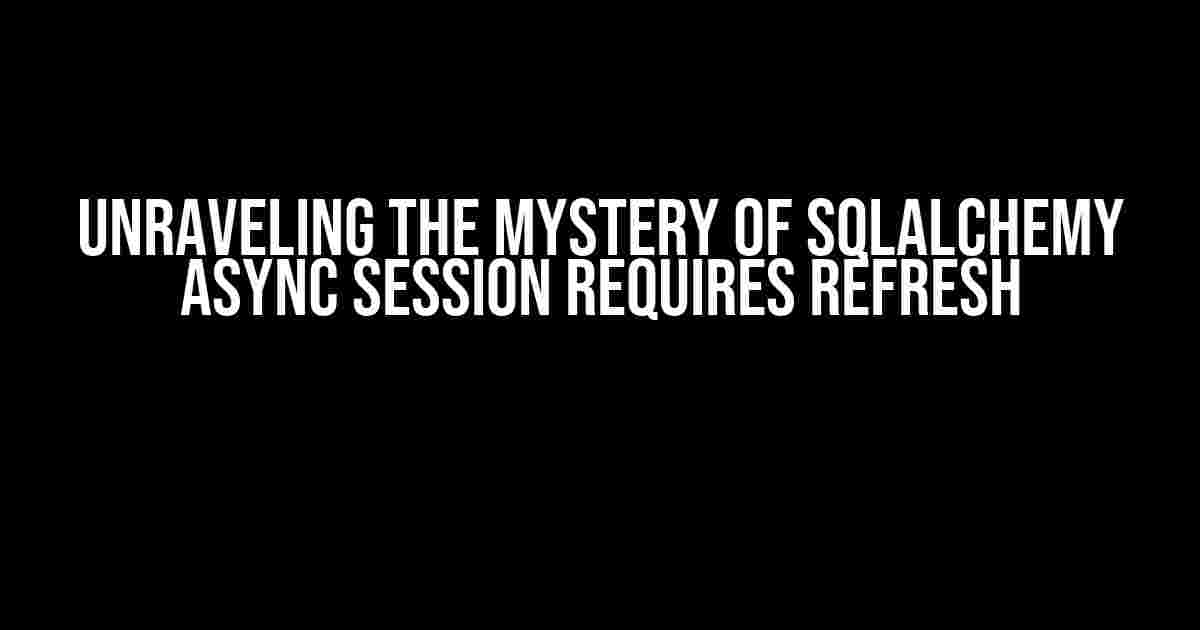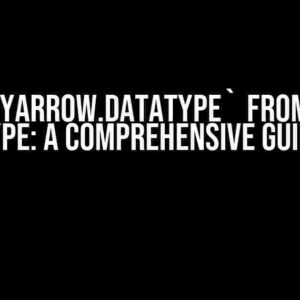Are you tired of getting stuck with the “SQLAlchemy async session requires refresh” error? Do you want to unlock the secrets of asynchronous database interactions with SQLAlchemy? Look no further! In this comprehensive guide, we’ll delve into the world of async sessions, explore the reasons behind this error, and provide you with step-by-step instructions to overcome it.
What is an Async Session in SQLAlchemy?
In traditional synchronous programming, database interactions are blocking, meaning that your program waits for the database to respond before continuing execution. Async sessions, on the other hand, allow your program to continue executing other tasks while waiting for the database response. This approach can significantly improve the performance and responsiveness of your application.
SQLAlchemy provides an async-friendly API for database interactions, allowing you to write efficient and scalable code. However, with great power comes great responsibility, and async sessions require careful handling to avoid errors like “SQLAlchemy async session requires refresh”.
Why Does SQLAlchemy Async Session Require Refresh?
When you create an async session in SQLAlchemy, it’s bound to a specific database transaction. If the transaction is rolled back or committed, the async session becomes invalid, requiring a refresh to re-establish the connection.
There are several scenarios that can lead to this error:
- Rollbacks**: If a database operation fails and the transaction is rolled back, the async session becomes stale.
- Commits**: When you commit a transaction, the async session is no longer valid.
- Connection closure**: If the underlying database connection is closed or timed out, the async session requires a refresh.
How to Refresh an Async Session in SQLAlchemy
To overcome the “SQLAlchemy async session requires refresh” error, you need to refresh the async session. Here’s how:
from sqlalchemy.ext.asyncio import AsyncSession, create_async_engine
# Create an async engine
engine = create_async_engine('postgresql+asyncpg://user:password@host/dbname')
# Create an async session
async with AsyncSession(engine) as session:
# Perform some database operations
result = await session.execute('SELECT * FROM users')
users = result.scalars().all()
# Roll back the transaction ( Simone, the error awaits!)
await session.rollback()
# Try to execute another query (BOOM! Error time!)
result = await session.execute('SELECT * FROM users')
# Oops! SQLAlchemy async session requires refresh
# Let's refresh the session
await session.refresh()
# Now we can execute the query again
result = await session.execute('SELECT * FROM users')
users = result.scalars().all()
Best Practices for Handling Async Sessions
To avoid the “SQLAlchemy async session requires refresh” error and ensure efficient async database interactions, follow these best practices:
- Use a new async session for each transaction**: Create a new async session for each transaction to avoid reusing stale sessions.
- Roll back transactions explicitly**: Always roll back transactions explicitly to avoid leaving the async session in an inconsistent state.
- Close the async session**: Close the async session after use to release system resources and avoid connection timeouts.
- Use a connection pool**: Utilize a connection pool to manage database connections and reduce the likelihood of connection closures.
Async Session Patterns and Anti-Patterns
Here are some common patterns and anti-patterns to keep in mind when working with async sessions:
| Pattern/Anti-Pattern | Description |
|---|---|
| Pattern: Using a new async session for each transaction | Creates a new async session for each transaction, ensuring a fresh start and avoiding stale sessions. |
| Anti-Pattern: Reusing an async session across transactions | Reuses an async session across transactions, leading to stale sessions and potential errors. |
| Pattern: Rolling back transactions explicitly | Rolls back transactions explicitly, ensuring a clean slate and avoiding inconsistent async sessions. |
| Anti-Pattern: Not rolling back transactions | Fails to roll back transactions, leaving the async session in an inconsistent state and prone to errors. |
In conclusion, the “SQLAlchemy async session requires refresh” error is a common pitfall when working with async sessions in SQLAlchemy. By understanding the reasons behind this error and following best practices for handling async sessions, you can ensure efficient and scalable database interactions in your applications. Remember to refresh your async session when needed, and don’t fall prey to common anti-patterns.
Now, go forth and conquer the world of async database interactions with SQLAlchemy!
Frequently Asked Question
Get the inside scoop on SQLAlchemy async session and its refresh requirements!
Why does my SQLAlchemy async session require a refresh?
SQLAlchemy async sessions require a refresh to ensure that the data is up-to-date and consistent with the database state. This is because async sessions do not automatically fetch data from the database, and a refresh is necessary to retrieve the latest data. Think of it like reloading a web page to get the latest updates – your async session needs a refresh to get the latest data!
What happens if I don’t refresh my SQLAlchemy async session?
If you don’t refresh your SQLAlchemy async session, you might end up with stale data or inconsistent results. This can lead to unexpected behavior, errors, or even data corruption. Imagine working with outdated information – not fun! Refreshing your session ensures that you’re working with the latest and greatest data.
How do I refresh my SQLAlchemy async session?
Easy peasy! You can refresh your SQLAlchemy async session by calling the `refresh` method on the session object. For example: `session.refresh(my_object)`. This will re-query the database and update the object with the latest data. Simple, yet powerful!
Can I use SQLAlchemy async session without a refresh?
Technically, yes, but with caution! If you’re working with a small, self-contained dataset, or if you’re certain that the data won’t change during the lifetime of the session, you might be able to get away without refreshing. However, this is not recommended, as it can lead to unexpected behavior or errors. Better safe than sorry – refresh that session!
What are some best practices for using SQLAlchemy async sessions with refresh?
Excellent question! Here are some best practices: use `refresh` regularly, especially when working with critical or frequently updated data; use transactions to ensure atomicity and consistency; and consider using a connection pool to optimize performance. By following these guidelines, you’ll be well on your way to becoming an SQLAlchemy async session pro!



